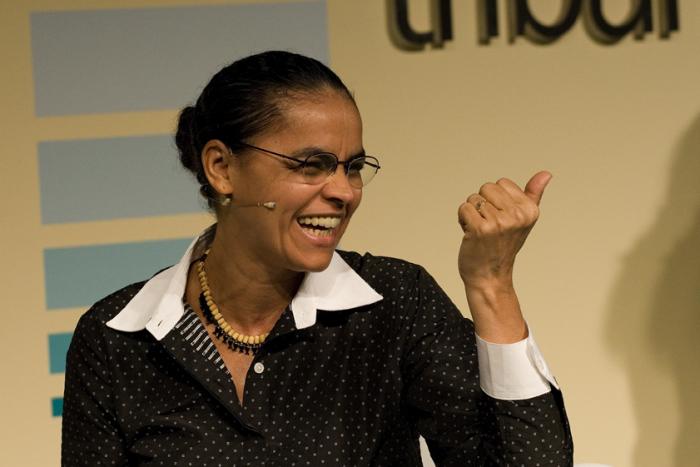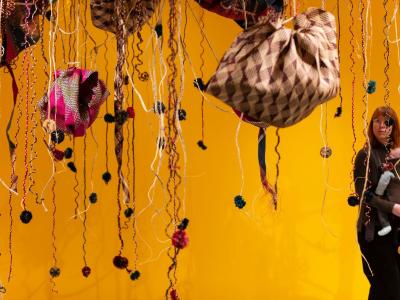Born in the small village of Breu Velho (70 km outside of Rio Branco) in the western state of Acre, Marina Silva spent most of her childhood in Rio Branco. Born of very humble rubber tappers in the Amazon region. Silva is a descendant of Portuguese and African ancestors in both her maternal and paternal lines. She was one of eleven children in a community of rubber tappers on the Bagaço rubber tree plantation. Growing up, she survived five bouts of malaria in addition to cases of hepatitis and metal poisoning.
Orphaned at age 16, young Marina moved to the state capital, Rio Branco, to study and receive treatment for hepatitis. She was taken in by nuns in a convent and received a Catholic education. Here, she became the first person in her family to learn to read and write. After leaving the convent, she went to work as a domestic maid in exchange for lodging. Despite being illiterate up until the age of 16, Marina managed to graduate in History at the Federal University of Acre at the age of 26. She also has a post-doctoral degree in Psychoanalytic Theory from Brasilia University and Psychopedagogy from Catholic University of Brasilia.
Her involvement in politics began alongside environmentalist Chico Mendes, who was assasinated for defending the Amazon, raising awareness and campaigning to preserve the Amazon and those who lived in it around the ‘seringais’ (rubber plantations). In 1988, whilst affiliated with the Workers’ Party (PT) she managed to be elected as councillor of Rio Branco. In 1990 she bagged a seat in the Legislative Assembly and 4 years later in the Senate, as the youngest person to ever be part of the Senate. She was Environment Minister from 2003 until 2008.
Marina left The PT and in 2010 entered the presidential elections as a candidate from the green party (PV), managing 3rd place with 19/33% of votes. Leaving PV in 2011, she set upon creating a new political party but failed when the party wasn’t able to collect a set number of signatures asked by the Electoral Justice so the party could be included in the 2014 elections; she then joined PSB.
Ms. Silva, who officially entered the race only a week ago, came out swinging from Tuesday’s televised debate. She attacked incumbent President Dilma Rousseff for failing to respond to massive street protests last year by Brazilians demanding better government and public services. And she criticized her other main opponent, Aecio Neves, a pro-business candidate with the Brazilian Social Democracy Party, for his record on education as governor as the state of Minas Gerais.
A frequent target of direct questions from the other six candidates participating in the debate, Ms. Silva made the most of the opportunity. She spoke repeatedly and confidently about her wish for inclusive government that would improve education, public safety and health care.
David Fleischer, a political scientist at the University of Brasilia, said her performance dispelled any questions that Ms. Silva, who is riding a wave of popular sentiment following the sudden death of her former running mate lacks the chops to vie for Brazil's highest office.
"Marina was the only candidate to present proposals for her future administration," Fleischer said. "The wave is here to stay."
Despite being the newcomer, Ms. Silva was already nationally known, having drawn nearly 20% of the vote in a 2010 presidential run. An environmental activist and evangelical Christian with reputation as a reformer, she could draw voters from both left and right. Critics argue that Silva so far hasn’t shown a knack for coalition building - she resigned from the PT and the Green Party over differences - and that her economic views aren’t fully formed, and her environmental activism doesn’t sit well with Brazil’s powerful agriculture and energy sectors.
Her rivals are already sniping at her relative lack of experience.But this is preciesley what others like about her. Maybe it will take a fresh approach to make a difference in what many see to be a jaded and corrupt political system. As suppoerter Rony Veiga N. Santos commentes: "She's for sure the one who is closest to bringing in a 'new' type of politics, and just by not coming from a politics background it's already enough to win my vote"
According to her website, reasons for voting for Marina include:
- She wants to better the country’s democracy and change the predatory way in which we destroy nature so a sustainable plan can be drawn.
- Deforestation in the Amazon reduced by 57% in 3 years due to the firmness of Marina’s involvement with environmental policies.
- She’s a magnet, attracting only good and honest people.
- She’s intolerant to corruption and will create a new government based in republican principals.
- She’s known internationally been named one of the 50 people in the world who can save the planet, by The Guardian.
- She believes it’s important to increase investments in technology so Brazil can take a big leap and become a great producer.
- She respects and knows how rich Brazilian culture is and circles herself with artists and intellectuals, listening to their proposals and concerns.
- She promises 10% of the Union’s gross revenues to be aimed to improve the quality of the healthcare system.
See more at http://marinasilva.org.br
















